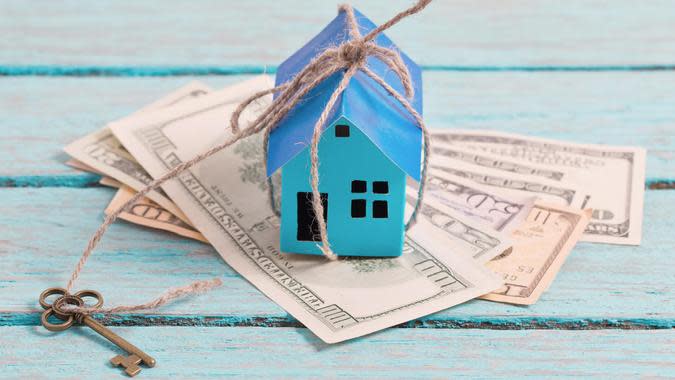10 Common Mortgage Mistakes That Hurt Your Finances

Buying a home is a big decision. More than that, though, it’s also a complicated one. There is a lot to think about, from where to buy down to how many bathrooms your potential new home has.
Discover: The Cost To Own a 3-Bedroom Home in Every State
Find Out: States With the Highest Property Taxes
In addition to the home itself, though, there is also the mortgage to consider. After all, for most people, buying a home is the single largest purchase they will ever make. Thus, it is no surprise that the mortgage behind the home is also crucial. In most cases, you’ll be repaying your mortgage for about 30 years. And taking on a bad mortgage isn’t something anyone wants to experience. Plus, some mortgage mistakes can cost tens of thousands of dollars.
Budgeting: The 50/30/20 Rule: Is It the Best Budgeting Method?
In this gallery, we’ll go through some of the most common mortgage mistakes. In addition, we will consider how they can affect your finances--and what you can do to avoid them.
Last updated: Oct. 21, 2021

1. Long Repayment Terms
One mistake homebuyers can make is opting for an unnecessarily long repayment term. This can happen when refinancing as you look to reduce your monthly payment. But that could be a mistake, said Andrew Latham of SuperMoney.com.
“This often happens when homeowners only focus on the interest rate or the monthly payment. To illustrate, let's say you have 20 years left on your mortgage, which has a 4.5% interest rate and a $200,000 balance. If you refinance it for a 30-year mortgage with a 3.5% interest rate, you will lower your monthly payments by about $370. However, this will cost you nearly $20,000 in additional interest over the life of the mortgage.”
Find Out: 26 Home Makeover Ideas That Each Cost Less Than $500

2. Buying Too Much House
Buying “too much house” was one of the contributors to the housing bubble leading up to the Great Recession. Lenders may be stricter now, but it can still happen, and that’s a problem, said Robert Johnson, chairman and CEO of Economic Index Associates.
“The problem with stretching to buy a more expensive home is that the payments are higher and may crowd out other investments — for instance, contributing to a retirement plan or funding a child’s college fund. In essence, they become ‘house poor.’" Johnson said that if mortgage payments hinder people’s ability to fund these other financial goals, they should buy a smaller home instead.
Cut Costs: 20 Insider Tips To Save Money on Every Part of Your Home

3. Failing To Shop Around
Getting a second opinion is important with many big decisions in life, and your mortgage is no exception. Every lender has different criteria when issuing a mortgage, so it pays to shop around. You can simply ask for a quote rather than getting deep into the weeds.
“Sometimes buyers will decide to use their current bank for a loan, and do not get a second opinion,” said Lisa Caldwell, owner of Range Homes. “While the bank may do a great job with a client's checking and savings accounts, that does not necessarily correlate to a good loan.”
Changes: Renovations To Make — and Skip — Before Selling Your Home

4. Shopping Around Too Much
While not shopping around for mortgages can be problematic, so, too, can shopping around too much.
“Oftentimes buyers get too many opinions,” said Caldwell. “When a lender runs the buyers' credit report, it will affect the buyers' credit score. We recommend following the advice of their real estate agent/professional for a lender who has a good track record in their area. Using a local, experienced lender is especially important if the buyers are in a competitive market.”
Watch Out: 50 Cities With the Most Overpriced Homes

5. Falling For Deceptive Marketing
Because mortgages are so complex, there is the possibility that a lender can try to deceive them, said Caldwell.
“For buyers that ‘shop’ the interest rates, they may find themselves in a bait and switch scenario. If a lender is claiming an exceptionally low interest rate, there is likely a catch. Perhaps this means higher than average closing costs, or by the time the buyers are ready to ‘lock’ their interest rate with the lender, the rate is considerably higher.”
Did You Know? Best Place To Buy a Home in Every State

6. Interest-Only and Adjustable Rates
Another way lenders can coax buyers into an unfavorable mortgage is by offering different types, such as interest-only and adjustable-rate mortgages. But Caldwell also warned about these.
“Buyers need to consider their goals and make sure they communicate those goals to the lender. For example: a 30-year with a fixed interest rate is strongly recommended. However, we are seeing buyers getting into loans that are ‘interest-only’ and hence the principal is not paid down. There are also loans that are "adjustable," so the interest rate starts low and increases over time. These can be very risky, unless you're next in line for a big promotion – or winning the lottery.”
Read More: 8 Insider Tips to Get Rich in Real Estate

7. Only Considering Interest Rates
Another mistake people can make with their mortgages is to only consider the interest rate. But there is more to a mortgage than interest, said Ryan Dibble, COO of Flyhomes.
“Many homebuyers focus on the interest rate when shopping for a mortgage. However, every mortgage company has different fees, credits, or discount points associated with their interest rates. Be sure to compare each lender’s annual percentage rate (APR) and their total closing costs as well. The APR includes fees and costs associated with obtaining the loan—in addition to the interest rate—to give you the total cost of the mortgage. Closing costs can include fees for services such as underwriting, processing, appraisal, credit reports and mortgage insurance.”
See: Real Estate Agents Reveal Their Secrets To Get Your Home Off the Market Fast

8. Not Asking the Right Questions
Buying a home is a long and complicated process, and you might be tempted to breeze through it as quickly as possible. But Dibble said asking the right questions is important.
“The service your mortgage lender provides is just as important as the price you pay. Make sure you choose a lender who is going to guide and advise you throughout the process, like a concierge. If the lender you’re considering is responsive, proactive, and pleasant to work with, that’s a good sign! If a lender you’re evaluating seems annoyed when you ask a question or asks for the same information more than once, those are warning signs that you likely won’t get the kind of service you need.”
Check Out: 32 Insider Tips for Buying and Selling a House

9. Settling For Preapproval
You may not know how much home you can afford, especially if you are a first-time homebuyer. A preapproval can give you a rough idea, but Dibble said pre-underwriting is crucial.
“Put simply, pre-underwriting is the only reliable answer to a big question: How much can I spend on a home? It’s a written commitment from a mortgage lender confirming the loan amount and program you’re qualified for. Not only does pre-underwriting give you certainty about how much you can offer on a home, it makes you a more competitive buyer and it might even get you the home you want for a lower price.”

10. Tapping Equity When Your Home Value Rises
There is no shortage of lenders that will let you borrow against the value of your home. But doing so could be a mistake, said Denny Ceizyk, senior staff writer at LendingTree.
“Home equity can be converted to cash to make home improvements, pay off high interest rate debt or in the case of a reverse mortgage, to supplement your retirement income. But if a job transfer or financial emergency requires a quick move, you’ll end up netting less profit if you’ve taken equity out recently.”
More From GOBankingRates
Social Security Benefits Might Get Cut Early -- What Does It Mean for You?
Navy Federal cashRewards Review: With Great Benefits Come Great Rewards
This article originally appeared on GOBankingRates.com: 10 Common Mortgage Mistakes That Hurt Your Finances
